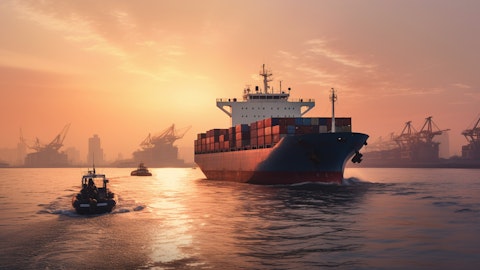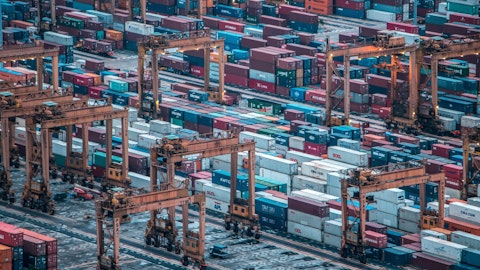Or can this thing continue depending on the opportunity to present themselves? So Hamish, I was wondering if you could answer that question. And then, also kind of — are you seeing greater interest because it becomes a little bit of the snowball effect where more and more of these come — more and more of these deals get done, maybe more and more come to you as well to — if you could talk about that?
Hamish Norton: Well, I mean first of all, from your lips to God’s ears; I — this is how we would love to have everything work out. First of all, let’s get the Eagle deal done first before worrying about what to do next. You know, there is a little bit of not wanting to bite off more than we can chew. And we do need to integrate Eagle properly and make sure we keep the best of both companies before we start looking for follow-on deals. But — you know, look, I don’t think there is a specific level at which the company is too big to manage. We are a pretty small company compared to say, a large airline or a large container line. And those companies are quite well managed. And I think Nicos Rescos may have something to say about our ability to manage a fleet of two or four times the size but — you know, if a container line or an airline can do it, I think we can do it.
And we haven’t seen an increase in interest yet but I think it’s reasonable to think we might once the Eagle deal is closed.
Amit Mehrotra: Okay, all right. Thank you. Congrats on all your success, everybody. Appreciate it.
Operator: Our next question is from Omar Nokta with Jefferies. Please proceed.
Omar Nokta: Thank you. Hey, guys good morning — or sorry, good afternoon. I just wanted to touch on a couple of mixed questions in the back and forth you had. And then also Petros, on some of your opening comments just discussing the market. Clearly, 4Q was a bit stronger than a lot of us were thinking going into the quarter, and then so far 1Q is averaging quite a bit better; definitely than last year but also your bookings to-date are higher here in 1Q versus 4Q. So just wanted to ask, you mentioned that the disruptions that are going on in the Red Sea and the Panama Canal have — maybe smoothed out a bit of the one/two decline that we normally would see. Obviously, that that seems like the main or it’s a big piece of what’s happening; but is there also something else happening? Is there demand story that’s driving this as well? Or do you attribute what we’re seeing in the market here really just due to the disruption?
Petros Pappas: Hi, Omar. First of all, I should also add the effect that the Ukraine war is having in the market, because there are second not — does not export any more to closer destinations in Europe but they have to export towards China and India, and therefore, that also has an effect. So all these along with the Panama Canal and the Red Sea, these three inefficiencies are creating a major positive for shipping, and they’re affecting the market during a quarter that would otherwise be slow — be slower. But overall, I would say that — first of all, I think that these inefficiencies will continue to exist; I don’t see them going away very soon. It will have to be several months or even years before we go back to normality.
So I think they will continue to support the market for a while. Apart from that, we see a strong U.S. economy, a strong Indian economy. We believe that China will support its economy going forward, and this is very important because during 2023, it was China single handedly that supported the trade. I think that they increased their imports by about 280 million tons, where the Rest of the World was actually negative. So we think China will continue because they have not yet accomplished their goals, along with U.S. and Indian economies, we think that the Rest of the World starts to recover as well. And don’t forget the environmental regulations. These are going to affect supply. There’s no question about that. And on top of that, we have a relatively low order book at 8.5%.
You will be seeing influx of vessels of about 3% to 3.5% every year. We think up to now, there hasn’t been much scrapping because the markets are decent. But in the future, they will have to scrap more. So we represent 3%, 3.5% influx and scrapping about 1%, 1.5%. It’s — we may be seeing 2% to 2.5% need for demand. And already, just inefficiencies cover that and go even further than that. So personally, I see for these reasons, I see a strong market during ’24 and most probably ’25 as well.
Omar Nokta: Great. Thank you Petros for that detail. And then maybe just wanted to switch gears just on the other topic or one of the topics being the dividend and there’s — and I think Amit was mentioning and clearly that’s been happening, which is that you become a bit more dynamic in terms of managing the fleet. It was much easier for me or for us when you had those 128 ships, and it was fairly static and so it was very easy for us to model the dividend. Given the buybacks, I guess, just in general, with you being a bit more active on the fleet front, you’re seemingly perhaps more transaction oriented. Any sort of thoughts on squeaking the dividend policy to a percentage of earnings payout or do you like, say, the strategic honesty or clarity of just the ending cash balance approach?




